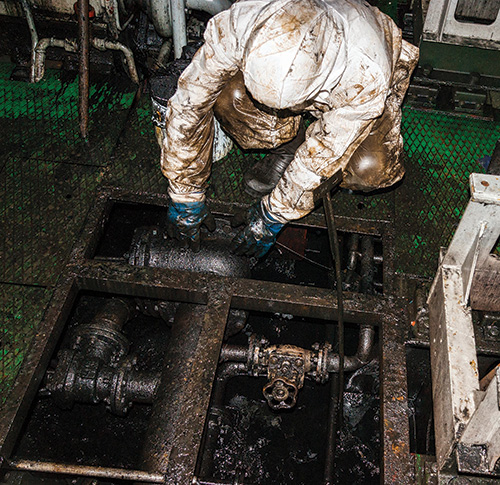
MSS Case August: Contaminated lube oil caused engine damage
The vessel was sailing when the high lube oil temperature alarm activated, and the main engine stopped.
Subsequent investigations revealed an abnormal level in the sump tank and the cooling water expansion tank had lost water. Cooling water had found its way into the lubricating oil sump and contaminated the lube oil system.
It was also found that the number 2 cylinder head was leaking coolant from a loosened guide bolt on the inlet valve crossbar. Attempts to tighten the bolt failed and so the cylinder head was replaced with a spare. Approximately 900kg of fresh oil was added and the main engine was restarted and the voyage resumed. No contaminated oil was drained off.
Two days later when the vessel was approaching the pilot station an alarm sounded indicating a high lube oil temperature from cylinder number 3. The engine was stopped, and investigations were carried out. These did not reveal any abnormalities and the engine was restarted. Shortly after the pilot embarked, the crankcase oil mist alarm was triggered followed by a banging noise from the engine and then again the engine automatically shut down. A tug provided assistance and the vessel anchored. It was decided that the vessel should be berthed with tug assistance.
The number 3 cylinder unit had suffered piston seizure. Further damage was noted to the number 3 big-end bearing and crankpin journal, caused by the contaminated lube oil.
An analysis of the lubricating oil taken three months earlier for the main engine, showed that the oil was within specification. Another oil sample was taken one month before the incident and the analysis at this time showed
a water content of 0.17%. For some unknown reason this sample had not been sent for analysis prior to the incident.
Read more about the consequences from the above, and the questions to this article:

MSS Case August: Contaminated lube oil caused engine damage
The vessel was sailing when the high lube oil temperature alarm activated, and the main engine stopped. Subsequent investigations revealed an abnormal level in the sump tank and the cooling water expansion tank had lost water.
For more Loss Prevention information, please contact:
Joakim Enström, Loss Prevention Officer
E-mail: joakim.enstrom@swedishclub.com
Each month, the Club’s Loss Prevention team issues a new safety scenario to assist members in their efforts to comply with international safety regulations and follow best practices.